http://www.csmonitor.com/layout/set/print/content/view/print/504815
1.Al Qaeda honchos offered “tributes”
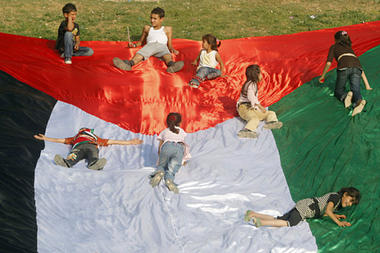
Palestinian children play on a Palestinian flag during a Fatah rally in the West Bank town of Nablus in this file photo. An Al Qaeda document says Fatah gave a monetary tribute to Al Qaeda for jihad.
(Nasser Ishtayeh/AP/File)
Like tribute money offered to Mafia dons, funds were offered to Al Qaeda out of fear. One letter in the new trove explores whether Al Qaeda leaders should accept such money. It notes, for example, that Fatah, the largest faction of the Palestine Liberation Organization, “has offered us funds, purportedly to [support] jihad, but there is another reason, namely their fear of becoming targets of our swords.”
On the plus side, the author notes that “these funds would go towards the purchase and manufacture of weapons.” It also points to insider fighting, noting that these funds might be used to counter the influence of Hamas, “who fear the growth of our influence and dominion.”
2.Time to invest?
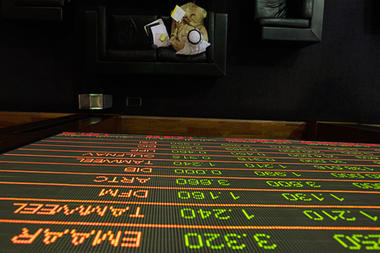
A scene from the trading floor of the Dubai Financial Market.
(Jumana El Heloueh/REUTERS)
One letter writer seeks specific advice from top Al Qaeda leaders, including Mr. bin Laden. “Is it permitted to invest funds in the stock market, buying and selling shares, for the goal of supporting the jihad, or investing some donation-derived funds in stock markets and shares?” he wonders.
The response is not included in the released documents, though Al Qaeda operatives are alleged to have used stock markets to attempt to raise money. According to the US Department of Justice, one Al Qaeda operative with links to bin Laden lost some $20 million through a Chicago futures brokerage firm.
3.The dilemma of drug money
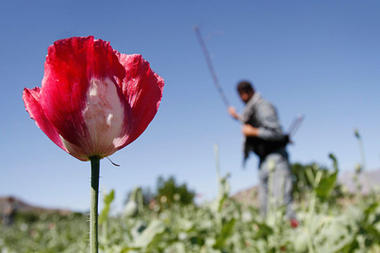
An Afghan policeman destroys an opium poppy field in Alingar, Laghman Province, east of Kabul, Afghanistan.
(Rahmat Gul/AP)
“Is it permitted to strike drug traffickers, eliminate them, and kill them, or not?” is the straightforward query of an Al Qaeda member. He struggles with the ethics of using money gained by such means, because drug use is forbidden in Islam. But he also notes a “technicality.” Perhaps, he wonders, it is “permitted to take funds which they have gained from drug trafficking” for the use of “luring fallen addicts to serve as double agents against the Jews” or “bringing down Jewish soldiers, particularly border guards, by means of drugs.”
4.Misgivings about suicide bombing
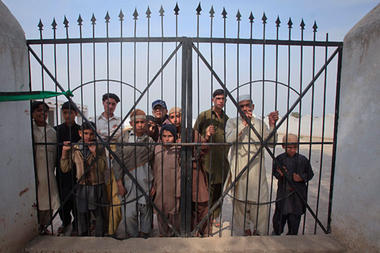
Residents stand outside a closed gate, near the site of a suspected suicide bomb attack in the outskirts of Peshawar, Pakistan.
(Fayaz Aziz/REUTERS)
One letter to the leader of the Pakistani terrorist group Tehrik-e-Taliban, which was responsible for the shooting rampage in Mumbai, takes him to task for using citizens “as shields without basing their action on the Shari’a” law.
It also decries the “killing [of] the normal Muslims as a result of martyrdom operations that takes place in the marketplaces, mosques, roads, [and] assembly places.” Included in the letter is a “short list on what is acceptable and unacceptable on the subject of kidnapping.” It urges the emir to “take the necessary action to correct your actions and avoid these grave mistakes; otherwise we have to take decisive actions from our end.”
5.The Sunni-Shiite divide
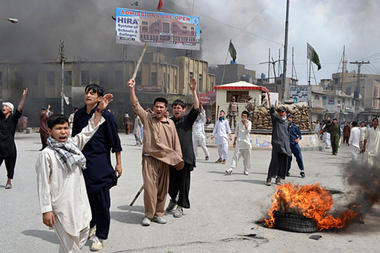
Pakistani Shiite Muslims shout slogans as a protest against the killing of their community members by gunmen in Quetta, Pakistan, earlier this year.
(Arshad Butt/AP)
The letter writer to bin Laden notes that among the groups with whom they are considering cooperating, “some of their people have adopted Shiite thought, God forbid.” Al Qaeda is comprised of Sunni Muslims who see Shiites as heretics.
But he notes, again, the practicalities of such an arrangement. “They have offered funding to use, in exchange for which we are to work with them… as a sort of propaganda; the catch being that we would conduct the operation with funding through them, and afterwards it would be announced that we cooperated with them.”









